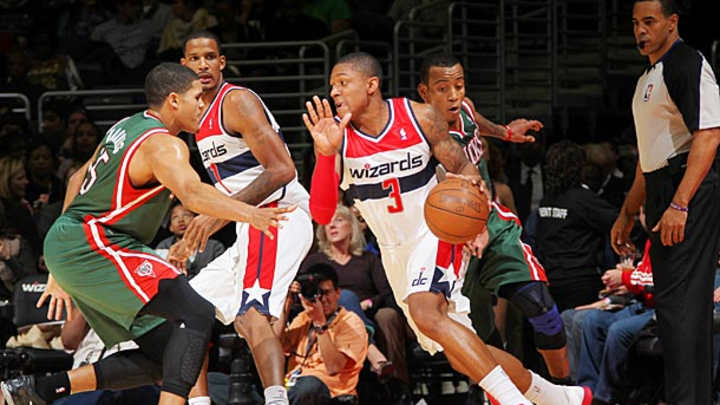Wizards' offense caves without Wall

Bradley Beal (3) and the Wizards are last in offensive efficiency. (Ned Dishman/NBAE via Getty Images)

By Rob Mahoney
The Wizards are already neck-deep in losses and at risk of seeing their season asphyxiated after only one month. Washington's defense has managed well enough. But with point guard John Wall sidelined, the Wizards have dropped nine consecutive games through scoring impotence alone.
The idea that the season is just beginning is supposed to offer some slight reason for optimism, with the remainder of 2012-13 bringing the chance for improvement. But with Washington, there's a distinct possibility that this is indeed only the beginning. The Wizards aren't likely to get any worse, but their roster lends itself to an offensive torpor that seems to already have them fairly well stuck.
Those offensive struggles seemed to catch up to coach Randy Wittman on Monday night after the Wizards fell to the Pacers, when he openly commiserated about his team's inconsistent play (via CSN Washington; PBT):
“I don’t know who to start, who to play, who not to play,” Wittman said. “It’s the confusion of different guys every game. We have no consistency of play in our group.”
...
“It’s just so inconsistent top to bottom,” he said. “I’d love to have an eight- or nine-man rotation. That’s my dream. And I’m playing 12 and 13 [players] every night. You can’t do that in an NBA game. You have to develop a [starting] group and a group that comes in. I’m having a tough time doing that.”
That Wittman has gone so deep into his bench in search of solutions says a lot; he has been very conservative with both his strategy and allotment of minutes in the past, and yet Washington's recent struggles have caused him to scramble. But one can't help but wonder if Wittman is searching for something that simply isn't there, desperate for the luxuries of better-built or more talented teams. The Wizards may be better than 0-9, but not by much. This simply isn't a team positioned to win all that many games, and without Wall, Washington is only that much more feeble.
Every team struggles with issues of consistency among its role players, but teams often mitigate those concerns with a schematic backbone and standout shot creators. The Wizards have something of an offensive scheme, but can't execute it. They also have role players aplenty, but no initial mechanism to cue their offense. Wall, a former No. 1 pick, may not have met expectations over the last two seasons, but he's still a talented dribble-drive player who gives Washington a default second option should the first fail. Every set has a contingency when Wall is on the floor, and he gives the team the potential to make something out of nothing when things break down. That's invaluable with a team starving for offensive talent, as Washington now knows all too well.
Without Wall as a fail-safe (not to mention the also inactive Nene), the Wizards are left aimless. They work hard and pass plenty, but can't beat single coverage, draw defensive attention and actually get the ball where it needs to go. An initial rebuff by the defense all but dooms Washington's execution on a given possession and closes a margin for error that is already painfully slim.
And so most Washington possessions mirror the form of a mid-level NCAA team trudging its way through a 35-second shot clock. The Wizards make half-drives against a sunken defense only to kick it out to shooters who often aren't capable or aren't ready. They spend entirely too much time working the ball around the perimeter without the means or lanes to create real dribble penetration. It's as if the players expect the next swing pass to somehow get to Wall, and thereby remedy their inability to create offense.
***
Given Washington's limitations, more teams are crowding the paint and letting the Wizards beat themselves through errant jumpers and baffling decision-making. It's a strategy with unimpeachable returns: Washington ranks last in points scored per possession, faltering with a perimeter-heavy offense dependent on inaccurate shooters.
Bradley Beal, Martell Webster and Cartier Martin are the only Wizards making three-pointers at an above-average rate, and those three have attempted only 75 combined. On the other side of the mean, Washington's four high-volume shooters -- A.J. Price, Jordan Crawford, Trevor Ariza and now-former Wizard Jannero Pargo -- have almost doubled that mark, with 132 attempts, despite collectively shooting 28 percent from long range. That kind of inefficiency is simply what the Wizards are resigned to at this point, for reasons that have far more to do with the players' narrow skill sets than some reluctance to execute their particular commissions. Much has and will be made of the Wizards' lack of role definition, but this is simply a case of a mismatched roster collapsing on itself when the most crucial element is removed.
As long as Wall is out, inconsistency is the Wizards' only constant. Washington's 22-year-old cornerstone certainly has his faults, but his presence will eventually allow Beal and Webster better -- and more frequent -- looks on the perimeter. He'll take the ball out of the hands of Crawford, Ariza and Price and allow all to operate in more fitting capacities. Wall will offer big men Emeka Okafor and Trevor Booker more than meager scraps, and he could give the team that also ranks last in points in the paint a chance at scoring a bit (if only a bit) inside.
